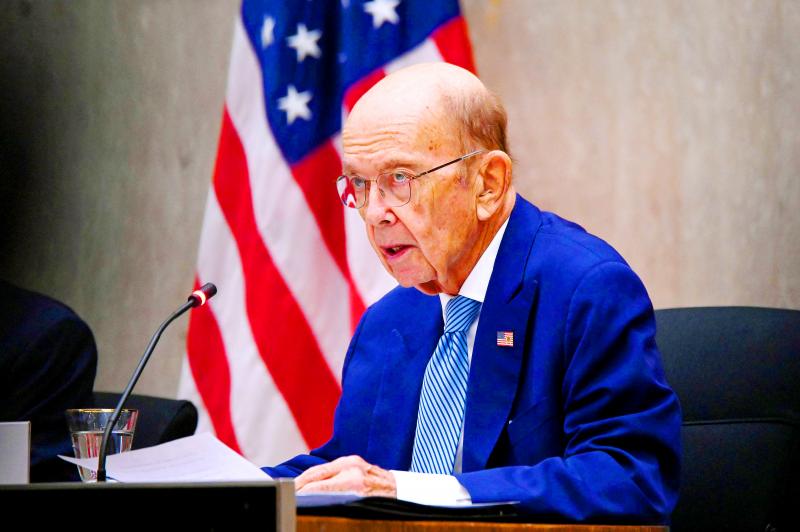Barely 48 hours before the arrival in China of one of US President Joe Biden’s most-trusted diplomats, Beijing on Friday announced its decision to impose counter-sanctions on seven US citizens and entities, including former US secretary of commerce Wilbur Ross, in retaliation against Washington’s earlier sanctions on Chinese officials over crackdowns in Hong Kong.
Biden’s administration announced sanctions on seven Chinese officials on Friday last week and warned US businesses of the “growing risks” posed by Beijing and Hong Kong.
It is not the first time Washington and Beijing have imposed mutual sanctions, but the latest round marks the first time China has done so using its new Anti-Foreign Sanctions Law, which was passed last month.

Photo: Reuters
Others affected in Beijing’s “reciprocal counter-sanctions” are the current or former heads of a range of US organizations, including the US Congressional-Executive Commission on China, the US-China Economic and Security Review Commission, the National Democratic Institute for International Affairs, the International Republican Institute, Human Rights Watch, and the Washington-based Hong Kong Democracy Council.
In response to Beijing’s sanctions, one of the affected US citizens, Human Rights Watch China director Sophie Richardson wrote on Twitter: “thanks, for the extra motivation!”
Since the enactment of the Anti-Foreign Sanctions Law, Beijing’s decision to impose counter-sanctions was expected, but the timing of it is indicative of the deteriorating US-China relations.
It also came just less than 48 hours before US Deputy Secretary of State Wendy Sherman’s visit to China today.
“Washington has reiterated that Sherman’s visit and talk with the Chinese side will be from ‘a position of strength,’ but Beijing may want to remind [the Biden administration] that they are equals,” said Ma Ji (馬吉), a senior C.V. Starr lecturer at Peking University’s School of Transnational Law.
“Of course, none of those targeted are in Biden’s inner circle, which means that Beijing still wants to continue the conversation with Washington, but by issuing this list shortly before Sherman’s visit, Beijing clearly intends to reduce her expectations,” Ma added.

In his National Day Rally speech on Sunday, Singaporean Prime Minister Lawrence Wong (黃循財) quoted the Taiwanese song One Small Umbrella (一支小雨傘) to describe his nation’s situation. Wong’s use of such a song shows Singapore’s familiarity with Taiwan’s culture and is a perfect reflection of exchanges between the two nations, Representative to Singapore Tung Chen-yuan (童振源) said yesterday in a post on Facebook. Wong quoted the song, saying: “As the rain gets heavier, I will take care of you, and you,” in Mandarin, using it as a metaphor for Singaporeans coming together to face challenges. Other Singaporean politicians have also used Taiwanese songs

NORTHERN STRIKE: Taiwanese military personnel have been training ‘in strategic and tactical battle operations’ in Michigan, a former US diplomat said More than 500 Taiwanese troops participated in this year’s Northern Strike military exercise held at Lake Michigan by the US, a Pentagon-run news outlet reported yesterday. The Michigan National Guard-sponsored drill involved 7,500 military personnel from 36 nations and territories around the world, the Stars and Stripes said. This year’s edition of Northern Strike, which concluded on Sunday, simulated a war in the Indo-Pacific region in a departure from its traditional European focus, it said. The change indicated a greater shift in the US armed forces’ attention to a potential conflict in Asia, it added. Citing a briefing by a Michigan National Guard senior

CHIPMAKING INVESTMENT: J.W. Kuo told legislators that Department of Investment Review approval would be needed were Washington to seek a TSMC board seat Minister of Economic Affairs J.W. Kuo (郭智輝) yesterday said he received information about a possible US government investment in Taiwan Semiconductor Manufacturing Co (TSMC, 台積電) and an assessment of the possible effect on the firm requires further discussion. If the US were to invest in TSMC, the plan would need to be reviewed by the Department of Investment Review, Kuo told reporters ahead of a hearing of the legislature’s Economics Committee. Kuo’s remarks came after US Secretary of Commerce Howard Lutnick on Tuesday said that the US government is looking into the federal government taking equity stakes in computer chip manufacturers that

CLAMPING DOWN: At the preliminary stage on Jan. 1 next year, only core personnel of the military, the civil service and public schools would be subject to inspections Regular checks are to be conducted from next year to clamp down on military personnel, civil servants and public-school teachers with Chinese citizenship or Chinese household registration, the Mainland Affairs Council (MAC) said yesterday. Article 9-1 of the Act Governing Relations Between the People of the Taiwan Area and the Mainland Area (臺灣地區與大陸地區人民關係條例) stipulates that Taiwanese who obtain Chinese household registration or a Chinese passport would be deprived of their Taiwanese citizenship and lose their right to work in the military, public service or public schools, it said. To identify and prevent the illegal employment of holders of Chinese ID cards or